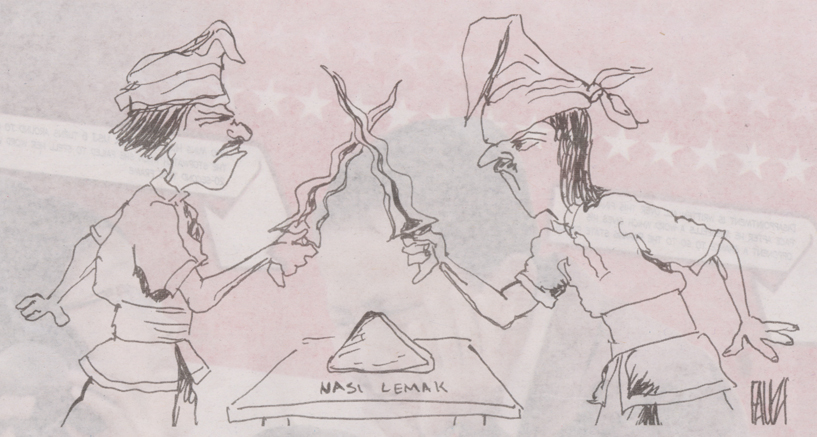'Nasi lemak' caught in the crossfire
Professor Tan Sri Dato' Dzulkifli Abd Razak
Comment
New Sunday Times - 08-05-2011
IN many parts of the world, hunger and malnutrition is becoming a major concern. With the increasing prices of food vis-a-vis income, food security is becoming an alarming problem across the globe. Many international organisations, including United Nations-related agencies, have warned about this for a long time. It is now made worse by the phenomenon of global warming.
On-going recessions and wars are compounding the issue.
Fortunately, Malaysia is not affected yet although there are clear indications that we have exceeded our societal needs and wants.
And food is an example, in terms of wastage, in particular. Just look at the leftovers at restaurants and hotels after every meal.
So it does not come as a surprise when the issue of obesity is beginning to wear us down once again. Nasi lemak has somehow got caught in the crossfire!

The question on everyone's mind is that if youngsters and schoolchildren are among the first to be educated about the risks of obesity, why start with school canteens?
How much damage can tuck shop food do relative to those at fast food chains?
Recess lasts about 30 minutes while some fast food outlets are open 24/7.
Is there the assumption that the emerging new generations are still gung-ho on canteen fare that has not changed much since the days of their fathers or even grandfathers?
What about the inviting fast food adverts specially designed to capture impressible groups? And their families too! On occasion, the food can be delivered to your doorstep.
Just reviewing these rather simple questions will open up a Pandora's box related to the issue.
It is interesting to compare and contrast the perceived influences of school canteens and fast food chains.
My suspicion is that the latter is far more responsible for obesity not only in children but also adults. After all a survey between January and December in 2006 found that 43 per cent of respondents had visited fast food outlets within that time frame.
Compare this figure to adults who do not have access to canteen food — even teachers prefer to pack their own food for work.
So do the authorities dare to tell the big businesses what to sell when and to whom — let alone classify certain food as "unhealthy"'? If they don't, then they should leave the poorer and smaller food vendors alone.
In 2007 the then Health Minister Datuk Seri Dr Chua Soi Lek reaffirmed: "The time has come (to ban fast food advertisements)." Then, one in four Malaysians were said to be overweight.
Denmark has made it illegal for any food to contain more than two per cent trans-fats since 2003.
How far has Malaysia progressed in banning trans-fats so that the anti-obesity campaign is seen as well thought out, without nasi lemak getting caught in the line of fire?
* The writer is the Vice-Chancellor of Universiti Sains Malaysia. He can be contacted at vc@usm.my
